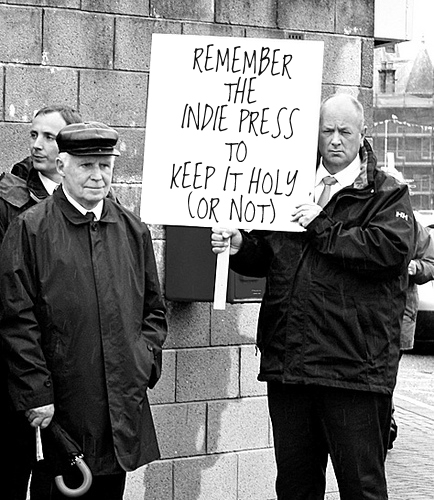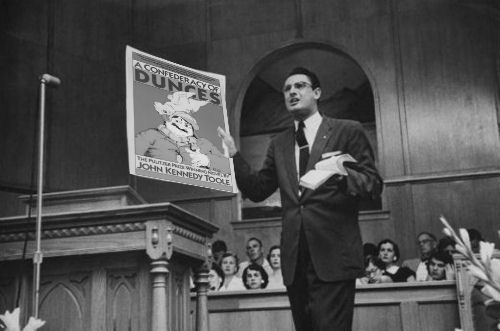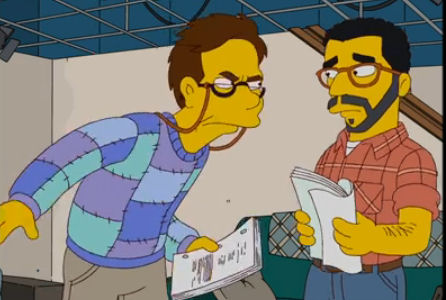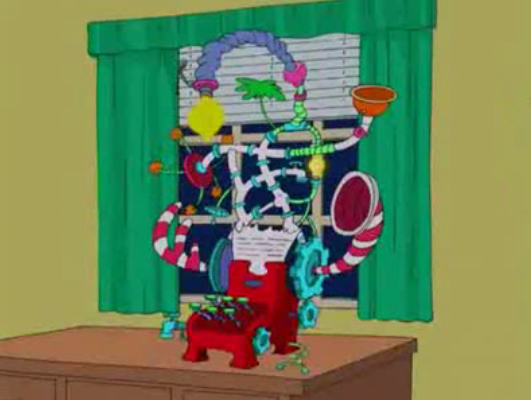Can you talk about a single book for one hour every week? Ministers/Priests/Pastors/Reverends/Etc. do. Why shouldn’t more books get the attention that religion texts do? Okay, most books don’t have a centuries-long history, a following (even a lukewarm one), or a cultivated lifestyle (excluding the Twilights and Harry Potters). What most books do have in common with religion texts is an industry infrastructure built to support their messages and the text itself; compelling narrative for the ultimate goal of better understand the human condition. But week after week after week…how? Religious clergy have the amazing ability to use a single book as a point of reflection for EVERYTHING, from contemporary world events to domestic irritants. Natural disaster? War? Impoverished country? Acne? Grab a Bible, right? Why not grab The Confederacy of Dunces or House of Leaves? Each has interesting characters. Each depends on the reader’s own moral scope for impact.…
Tag Archives newsletter
(part of my ongoing Unexpected Literary References series) More Unexpected Literary references from The Simpsons. Surprised? You shouldn’t be. Okay, The Simpsons, time to step aside and let some other cartoon be the smarty-pants lit reference show. You’ve been the hipster long enough. Your gags are disproportionately literary-based, and for that The Simpsons, I would appreciate more fart jokes. By now you are probably thinking, “wait, I thought you loved lit references in cartoons.” Good call you. Playwright David Mamet makes an appearance as the dumped-on sitcom screenwriter for the fake 80s Growing Pains derivative Thicker Than Water. Mamet is perhaps most famous for his 1984 Pulitizer Prize winning play, Glengarry Glen Ross. What many might not know (but The Simpsons writers surely did) is that Mamet wrote a 1987 episode of the TV drama Hill Street Blues and is also an oft-writer of the television series The Unit. I hope…
 Honestly, when in the company of commercial press authors, defending my place as independent press author can be difficult. To those who have “made it” into the commercial presses, I would assume my defense comes across not nearly as articulately and convincingly as I would hope. Afterall, the examples of small press authors immigrating into the world of commercial presses far outweighs the number of commercial authors willing to emigrate to the small press world. The commercial press gatekeeper is much more discriminating than the indies; I understanding the disbelief. I too would go commercial if given the right opportunity.
But things are getting easier. Not only are small press books showing face on historically commercial press-dominated shortlists (the recently announced 2010 National Book Critics Circle award finalists includes quite a few small press titles), but with the help of Jane Friedman the various publishing paths have been defined, and by extension, validated.
In the summary of her Writers Digest Conference 2011 talk on publishing options Friedman very clearly explains what she sees as the basic three options for publishing:
Honestly, when in the company of commercial press authors, defending my place as independent press author can be difficult. To those who have “made it” into the commercial presses, I would assume my defense comes across not nearly as articulately and convincingly as I would hope. Afterall, the examples of small press authors immigrating into the world of commercial presses far outweighs the number of commercial authors willing to emigrate to the small press world. The commercial press gatekeeper is much more discriminating than the indies; I understanding the disbelief. I too would go commercial if given the right opportunity.
But things are getting easier. Not only are small press books showing face on historically commercial press-dominated shortlists (the recently announced 2010 National Book Critics Circle award finalists includes quite a few small press titles), but with the help of Jane Friedman the various publishing paths have been defined, and by extension, validated.
In the summary of her Writers Digest Conference 2011 talk on publishing options Friedman very clearly explains what she sees as the basic three options for publishing:
- Tradition
- Independent or niche presses
- Self-publishing/DIY publisher
Pros, Cons, and Requirements: Traditional publishing:Hell, just read the original post.Small/independent press:
- It’s a commercially-driven business
- Competitive – many people are trying to break in
- National distribution – your work needs to merit that
- Slower to market (usually)
- Not the time to experiment
- Persistence & patience
- For non-fiction: you need a platform
DIY:
- Weaker distribution, smaller print run
- More personal attention, dedication
- Usually less money
- Niche marketing – smaller, specialized market; they’re experts in the field
- More accepting of “art” (could be nonprofit), more service-minded
ALL of the options actually require energy to market and promote. It all boils down to you – your strengths, your work, your readers – to determine what’s best.
- Entrepreneurial spirit
- Direct connections with readership (for sales)
- Must be comfortable with technology
- Must enjoy connecting with people (online and off)
- Requires energy to market and promote
When I’m not authoring mind explosions, I spend part of my time professionally involved with social media. One of the items my company stresses with our clients is that social media is not about pushing a message of product, product, product. It’s about engaging with customers and potential customers on a personal level. This means breaking the traditional advertising bullhorn approach of “BUY THIS NOW” with quips about the weather or TV shows, for example (though perhaps still tangentially related to the company’s product line). For most companies, dialog sans advertising is a foreign concept. For authors, this should be easy. Authors are their books Authors are inextricably linked to their products in a way that traditional companies are not. Denis Dutton in The Art Instinct: Beauty, Pleasure, & Human Evolution explores the idea that fiction always concerns and navigates three persons, one of whom is the author. “There is…
(part of my ongoing Unexpected Literary References series) Season 1, episode 15 ("Star Trek"), of the always entertaining "American Dad" plots the sudden rise of Steve Smith as a children's book author. This premise, of course, is perfect for literary nods. Strange, though, that I only caught two. See the entire episode here: Additional hilarious photo (I paused the embedded video at just the right/wrong time):
The December 31st, 2010 episode of the New York Times Review of Books podcast focused on a conversation on the relevance of professional literary criticism, especially in respects to the ‘everyone does it’ mentality associated with Amazon book reviews, Facebook statuses, and amateur lit crit blogs. Though the entire conversation was extremely interesting, the following point was especially intriguing. Said Katie Roiphe, a professor at the Arthur L. Carter Journalism Institute at New York University, about the current position of a critic in relation to what so many people want to call today’s death of literature (slightly paraphrased; dates are my insertions): It is tempting to say that we live in this dangerous death of literature, but the critic has always said that. If you go back to Matthew Arnold (1822-1888), if you go back to Dwight Macdonald (1906-1982), Randall Jarrell (1914-1965) and their generation. There is something romantic for…
During 2010 I went from a seldom-posting recluse to an annoying gnat. But apparently some people like being bothered by insects, because a few of my posts actually rose out of the white noise to become respectable accidental meant-to-search-for-porn landing pages. #1 | Great Unexpected Literary References (posted in June) Top entrance keywords: literary references, literature references in family guy, south park literary references, simpsons literary references, family guy brian great expectations reference #2 | Peter Griffin does porn and literature Top entrance keywords: peter griffin porn, griffin porn, caleb porn, porn in literature, porn literature #3 | My 2010 Lit Midget list of forthcoming small press books Top entrance keywords: midget list, noah cicero the insurgent, "noah cicero", "termite parade", "letter machine" #4 | You decide what I wear; voting for the Stranger Will cover Top entrance keywords: stranger vote 2010 nov, stranger vote november 2010 (most of the…





